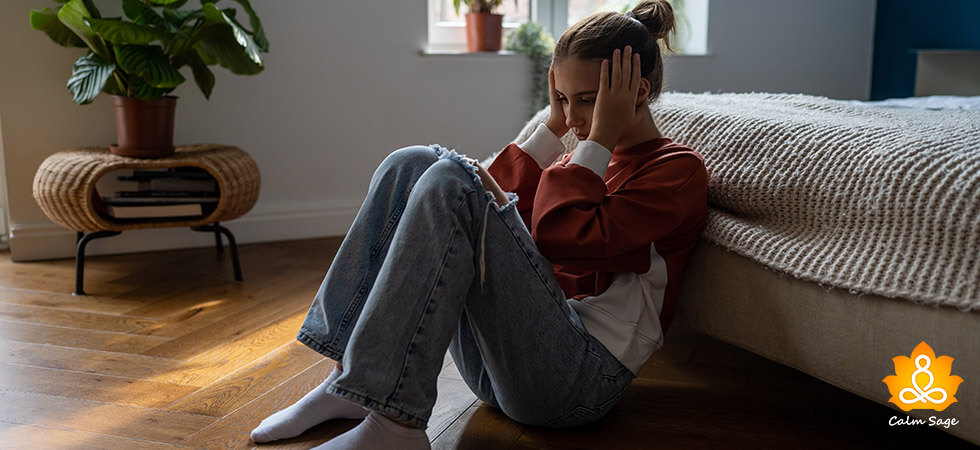Can Anxiety Cause a Loss of Appetite?

Eating healthy and nutritious food is recommended to keep the body nourished. Yet when people feel anxious, they either indulge in overeating, consume unhealthy food, or completely stop eating. Whatever the case, none is good for mental and physical health.
That said, if you struggle with a lack of appetite when you feel anxious, it could be a sign of something serious. Therefore, before it is too late, pay attention to it. When you feel anxious, your body triggers emotional and psychological changes, affecting your stomach and digestive tract and making you lose your appetite.
Everything is fine if this happens for a while and you feel hungry as you use it. However, if that is not the case and you do not feel hungry, it’s time to ask yourself, Am I stressed?
If the answer is yes, relax and work on your mental well-being. Changes in appetite indicate that you might be struggling with different problems. Keep reading to learn what that can be and how appetite loss and anxiety are linked.
Why do people stop eating when they feel anxious?
Usually, people believe that binge eating is the result of anxiety, but do you know some people completely stop eating and think their problems are bigger than eating? They even get overwhelmed with the thought of eating and feel nauseous when eating a bite. This happens as their fight-flight-or-freeze response shifts focus to the root of stress.
Some people respond to stress by running away from the situation, while some try to adjust to the situation and end up binge eating. People who lose their appetite are the first type. They are so consumed by stress and anxiety that they stop paying attention to performing basic tasks like eating. The fight-flight-or-freeze response releases stress hormones to the extent that the appetite is suppressed.
Physical symptoms that show stress can suppress appetite.
When a person is stressed or anxious due to any reason, be it the loss of a loved one, breakup, losing of job, or anything else, and they know they should eat but can’t, they show the following symptoms:
- Eating or even thinking of it makes the person nauseous, and drinking water is also a chore.
- Even the thought of eating seems unappetizing.
- They feel their muscles are getting tense, or there is a knot in the stomach.
- Stomach ulcers as the person stops eating for more extended periods.
- They feel constipated, suffer with diarrhea and indigestion
- Increased breathing, heart, and blood pressure are also noticed in some cases.
- Pale or flushed skin and shakiness are also some physical symptoms.
How to Regain your appetite if you lose it
If you’ve lost your appetite because of anxiety or stress, you can try following these tips:
1. Identify your stressors
Knowing the stressors behind appetite loss will help you understand the root cause. Once you can narrow it down, you can work with a therapist to learn how to manage it.
When you are aware of the physical sensations that are caused by the stressors, it is easy to understand what conditions trigger anxiety, and you can avoid it or be prepared for it.
2. Get enough sleep
Sleeping well is essential to managing a lack of appetite caused by stress. Proper sleep can help manage stress, reducing the release of stress hormones responsible for losing appetite.
3. Create an eating schedule
Someone who has lost their appetite by creating a schedule can return to the state where they start feeling hungry. When a person’s hunger and fullness are regulated, they start eating consistently as they feel the urge to adhere to the schedule.
If you set a timer for meals, even if your appetite is decreased or you don’t feel like eating, you can return to the original state where you used to feel hungry.
4. Find foods you like
When anxiety is high, people often don’t like eating big or small meals, but they need to eat. Hence, instead of eating in one go, you can switch to mild foods like rice. In addition, look for food that can keep you full and nourished throughout the day and during stressful periods. You can eat soups, meal replacement shakes, fruit smoothies, green leafy vegetables, etc.
This way, you won’t have to force yourself to eat, and you can keep your body nourished. When doing so, people struggling with anxiety should avoid eating food high in fat, sugar, and salt. Also, they should limit consumption of caffeine and alcohol as they cause digestive problems. Read here to learn about foods that can help reduce anxiety.
5. Understand Anxiety
Things alone won’t work by getting enough sleep, creating a schedule, or knowing stressors. To work on the loss of appetite, you need to understand what anxiety is and what are its causes. You need to pay attention to your physical and emotional sensations. This will help understand the sources of stress, making you create a plan to reduce them, thus decreasing anxiety and its symptoms.
6. Practice stress management
To reduce anxiety and start eating again, you can try to include some stress management practices in your routine This includes:
- Deep breathing exercises
- Guided imagery meditation
- Meditation
- Mindfulness
- Progressive muscle relaxation
Read about different types of meditation and how to practice them here
Remedies and treatment
When you experience a loss of appetite for 2 weeks or more due to anxiety, consult a doctor, as losing appetite in the long term impacts your health. A doctor can help understand the reasons for appetite loss and help you work on them.
They can even share techniques that will help manage and reduce anxiety. This can include therapy and therapy and lifestyle changes.
In severe cases of anxiety, medication might also be prescribed.
Other causes of appetite loss
Anxiety is not the only reason behind appetite loss. You can lose your appetite even when you struggle with the following:
- Depression
- A stomach bug that makes you vomit, suffer from diarrhea, and loss of appetite.
- Sometimes medicines, like antibiotics and pain relievers, can also reduce appetite.
- When you exercise more than required, you might experience gastrointestinal symptoms. Also, you might have to encounter intestinal cramping after periods of intense activity
- Pregnancy
- Illness
- Aging can also cause appetite loss due to loss of taste and smell.
Anxiety and Appetite Are Certainly Related
Anxiety and loss or increase in appetite are co-related. As the person feels anxious and stressed, the body experiences hormonal changes, which causes some people to eat a lot while others avoid it. If you have been experiencing either loss or an increase in hunger for more than 2 weeks, it is best to consult a doctor, as they can diagnose the issue and help you manage anxiety and stress.
Once a person addresses the stressors and reasons causing anxiety, it is easy to go back to regular hunger levels. If you ignore this appetite change, you might suffer serious health consequences.
Therefore, before it is too late, take a step. You just need to look for help, and many people will be standing there to help you. So, do not fear. Just look for support, and you will find it.




















